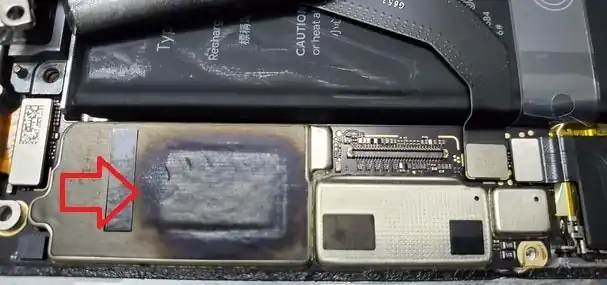Overheating of the original Google Tensor caused the thermal paste over it to burn on a Pixel 6 Pro. The reason for this heating was only a 10-minute phone call, the user reported on Reddit. He has shared a photo of the internals of the device which shows burnt marks over the SoC giving an idea of the amount of heat it generates. Not to mention, the generated heat is beyond the capacity of the heat sink over it to keep it below the safe limit.
Google will design the chips completely in-house and use a more efficient TSMC 3nm process in the Tensor G5 in 2025

The root of the problem seems to be the lower power efficiency. What it means is that for a particular task, the chip consumes relatively more power for a given operation and dissipates more heat as well. Tensor chips are fabricated in Samsung‘s foundry, which is considered to be the main reason for the inefficient nature of Tensor and Samsung’s Exynos chips as well. Although Samsung’s fabrication process has improved in terms of the power efficiency of the end product, the original first Tensor chip is from three years back and things were even more inefficient back then.
Speaking of the improvements in thermal efficiency, some reports still show that the third version of the Google Tensor still throttles during tests more when compared to the competition. The Mountainview-based giant has continued to focus on AI-based tasks for Tensor over the years and dialed back the performance of Tensor G3 to avoid overheating issues.
Considering that Google’s fully home-grown Tensor G5 chip won’t be available until 2025, next year’s Google Pixel 9 series phones will likely still suffer from power efficiency issues to some extent – either a competitive performance with a temperature higher than usual, or a dialed down performance to avoid overheating – neither of which seems to be an ideal solution.
The Tensor G5 chip will not only be completely designed by Google but also use the more efficient TSMC 3nm process, which will theoretically bring a notable improvement to the Google Tensor G5.
For now, if your Pixel phone overheats, stop the operation that causes your phone to heat up and turn it off if possible until it cools down.
Related:
- OnePlus 12 Flagship Phone is now available for Pre-Order
- Xiaomi 13 Ultra Premium Camera Phone is now only $799
- Get $100 OFF on Xiaomi 14 Pro at Giztop (1TB Variant)
- Best Messaging Apps for Android in 2023
(Via)





